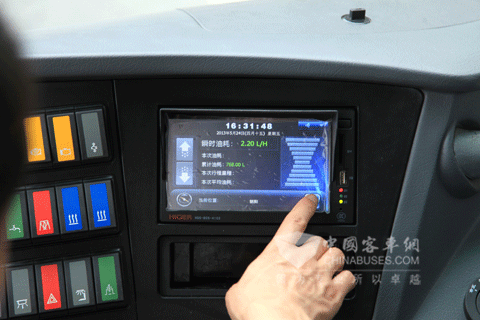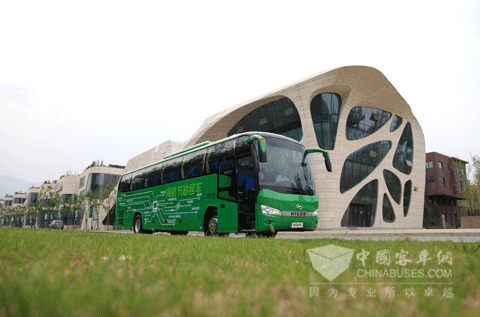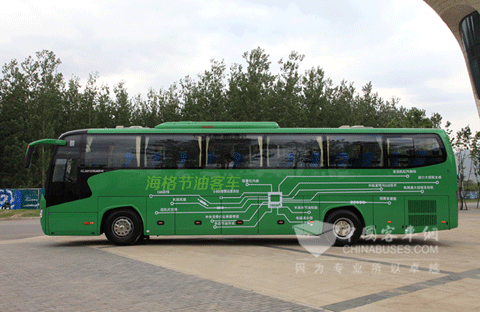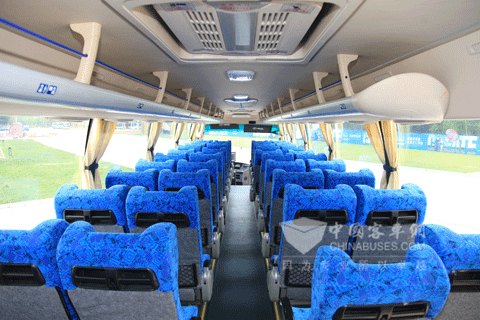The oil of green paint on the whole body of KLQ6122KA perfectly corresponds to its idea—fuel efficiency. Rounded processing on junctions of the body line together with elaborate streamline configuration of low wind resistance ensures its fuel efficiency from appearance.
Rather than rounded exterior design, our journalists prefer its interior design. Not only the interior design of passenger zone and layout of seats, but also details of driver zone are almost ultimate flawlessness. With mainstream colors from upper light to nether deep, beige canopy covering and seat cloth of dark blue patterns, interior design is full of elegance and vigor.
Since LWH of the bus is 12000*2500*3610mm, good softness, perfect lumbar support of backrests, higher convex support on both sides of head position of seats, and encapsulated design give higher difficulty of fatigue to passengers. Press the button of nether seats, slightly pull out, and then the seat next to aisle would extend extra lateral 80mm, which is longer than other similar buses. Compared with a majority of competitors’ buses, the seat armrest and adjusting switch of this bus has a big difference in the luffing convenience, low rate of failure and high rate of utility. In addition, the adjusting switch on the backrest is on the right front of the seat next to aisle, which is easily turned on and off with slight strength and wider angles.
Dynamic invigorates, Transmitting optimizes
The bus is equipped with Yuchai YC6MK340-40 engine of low revs and high torque, which meets with national IV. Its standard configuration includes fuel-efficient switch, special fuel-efficient nozzle, special crankcase and low-inertia turbocharger. Independent electronic control calibration technique is adopted and can be calibrated individually. The rev of the engine is set to the most perfect state to realize the minimum of speed and throttle angles. Thus, fuel-efficiency is realized.
Appearance of Higer Smart Fuel-efficient Bus
As for the intake and exhaust ports, larger intake port in the middle coordinates new air filter of high flow, which makes intake pressure smaller and 30% increase of filtering area than traditional one. The use of low-back-pressure muffler reduces inner resistance coefficient by 78% and loss of engine power. This effectively reduces the exhaust gas temperature of the engine and raises 2% of fuel efficiency.
Transmission system adopts imported main retarder of high torque, consisting a perfect match with Fast’s six speed transmission and the running conditions. This makes the engine running longer in the economic rev.
It is worth mentioning that the bus is equipped with cylinder braking technique of the engine instead of the same retarder like other large bus. There is no fuel consumption during the process of cylinder braking. No thermal decay is created in the continuous braking, which makes it suitable for downhill braking in the long distance. Weight reduction and braking both are ensured. What’s more, it is of low cost of maintenance.
Lightweight design, Weight loss environmentally
The bus also integrates technical accumulation of Higer and Scania—central keel full-load frame design, which improves whole frame's anti-impact with remarkable effect of lightweight. Lightweight biaxial transmission of aluminum covers not only gives less heat, high efficiency, and high carrying capacity, bus also makes gear engagement more stable and lower noise. Interior design of air conditioner and seats are of high-strength and lightweight material. By lightweight design of the vehicle with help of computer simulation and finite element analysis, loss of weight is very obvious with 400 kg loss of weight.
Energy efficiency management, Energy consumption reduction
Thermal dissipation system uses “electromagnetic clutch+ fan of high-performance+ windward grille”. The windward grille accelerates inner air flowing. This combination can control the relationship between water temperature of the engine and the rev of the fan precisely, maintaining the effect of low rev of the fan and high thermal dissipation.
Interior design of Higer Smart Fuel-efficient Bus
The glass is of Nano coating, shielding over 99% ultraviolet rays and 80% ultrared rays with transmittance of national standard. Total solar energy rejection increases averagely 75% compared with traditional glass, which reduces inner temperature too much influenced by outer temperature. Hence, it makes a contribution to energy-saving effect of the whole bus.
Windward air conditioning system uses transferring heat technology of concurrent flow through micro-channel. Coordinating with external structure design of patent of low flow resistance, it improves heat exchange capacity per unit volume about 30% with 1% fuel saving ratio.

Higer Smart Fuel-efficient Bus Equipped with G-BOSⅡ
It’s worth mentioning that Higer together with Michelin equips fuel-saving tires of special tire formula and decorative pattern technology which lowers rolling resistance and oil consumption.
Smart management, Technological oil-saving
G-BOS smart operation system Ⅱ, leading car networking upgrade of the industry, not only supports our independent Beidou navigation system, makes the interface of background management website more practical and convenient, delivers data of maintenance, operation and safety that administrators need most to desktop and realizes board management, but also realizes management of drivers’ driving behavior, precise measure of oil consumption and realizes continuous oil-saving effect by management and improving driving skills.







